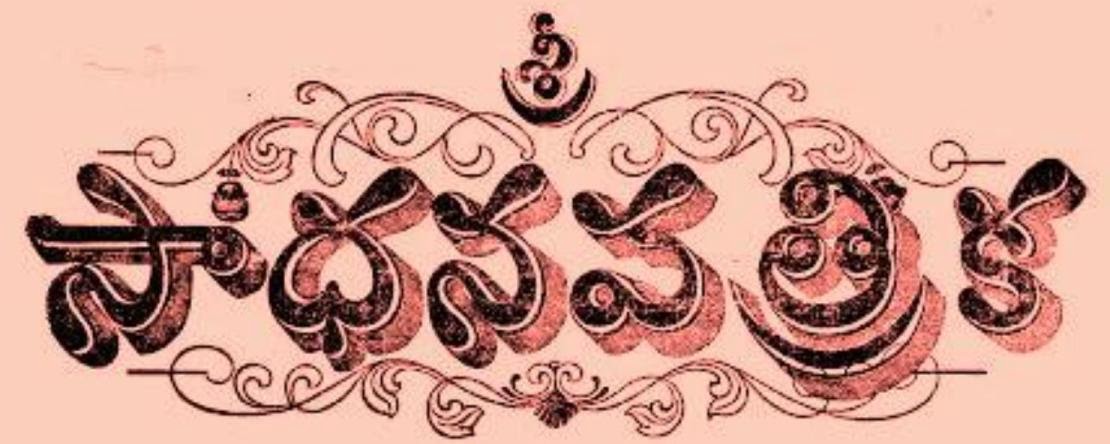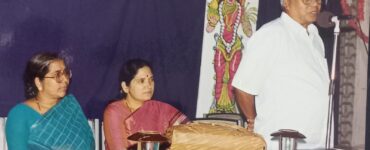This is a modern re-telling, in the form of letters in public, of the famed story of Sugatri and Shaleena from Pingali Surana’s Kalapoornodayamu (16th century). Surana’s Sugatri learns from experience that external ornaments do not please her husband, Shaleena, and that it is only by closely following and participating in his labour of tending the garden that she can win him over, including physically. The modern Sugatri challenges Shaleenudu (they are both unmarried in the modern version) about the roles Shaleenudu expects women to play. She lays down certain preconditions for her to accept him.
After they unite, the legendary Shaleena asks goddess Saraswati to ensure that Sugatri doesn’t get pregnant so that she retains her youth. Sugatri then turns into a man (and Shaleena becomes the woman) so as to fulfil her desire to have a son. The son born to them is Kalaprapoorna. (In the role reversal, Shaleena would obviously have to become the dutiful wife.) The modern Sugatri, on the other hand, lays down a condition that Shaleenudu accept her in a post-puberty marriage so as to bring about the role reversals he is prepared to go through.
What follows is the English translation of the modern re-telling that appeared in the columns of Sri Sadhana Patrika in 1926.
Sri Sadhana Patrika
Volume 1. No.2. 1926 August 21 Saturday
Letters to the Editor
Sir!
I received with gratitude the first issue of your “Sadhana Patrika.” I enjoyed reading to the last detail not only the editorial essay but all other things contained in it. But one deficiency is striking. In the columns of your journal you have not written anything about things concerning women. The whole world is made up of women and men. Woman is as essential for creation as man. God created man and woman as equals in the world. If one has more physical strength, the other has intelligence and beauty. But man has turned those with less strength (women) into slaves. As though to hide this injustice, the rishis created loads of palm leaf books, enumerating the duties of pativratas. On top of it, being biased, scholars keep saying that women should not get educated, that they should not hear the Vedas. Perhaps they don’t know that women like Gargi have even created some of the riks in the Vedas. Men have attributed male names such as Narayana, Rama and Krishna to God who is beyond gender and made them their own. Why didn’t god who was born incarnate in various male forms to improve men not take on female incarnations to improve women who are in a much lower state? But, women nowadays are getting educated and are succeeding in the degree examinations. Women like Tarabai are being born as though to lower the pride of arrogant men who imagine that there is none stronger than them in physical strength. Haven’t we read in the papers recently of an American woman having crossed the English channel (between England and France) which is more than 20 miles wide? In the Hindu country there are equal number of women and men. If half the population of a country is uneducated, how can it progress? Can we with one eye, one leg and one hand competently go about our daily chores? You think about this impartially and fulfill your obligation. Pardon me for writing to you, which I did only because you had said that you would rectify things if anybody points out the drawbacks. I pray once again that you will provide appropriate space to essays concerning the progress of women in your journal. I will continue to remain, as one who desires the improvement of your journal.
Your loving “correspondent”,
- “K. Sugatri”
Volume 1. No.3. 1926 August 28 Saturday
Letters to the Editor
Sir!
The letter by Smt. K. Sugatri in your previous issue surprised and saddened me. Even though I am one to think that women’s education is good for the welfare of the country, I don’t think it is right for women to lay blame on men and invite them to fight as soon as they have received some learning….
It is true that women (who have bodies of a flower) are intelligent. Even so their intelligence is fickle-minded. They may become skilled in fine arts. But studying scientific things is surely beyond their capacity. The courage required for politics is beyond their reach…. Women’s mind is like that of a sharp pen knife. It can cut up any tiny thing. Man’s mind is like a sword. Even if it is of no use to skin oranges it can be used to kill enemy forces in the battle field.
…. If one observes animals and birds in the world, it can easily be discerned that beauty lies more in the male kind than the female species…. So is the case among human beings. But women look beautiful because of the dress and ornaments they wear….
…. In which house is the man independent? The husband is the one who toils and earns….Is it like this in the western countries? Doesn’t Sugatri know that the family won’t run without both wife and husband working and bringing an income there?
….If women’s education had been banned by the rishis, would it have been possible for Gargi to have written the riks and for the rishis to have recited them? ….
24-8-26 “Shaleenudu”
Vol. 1. No. 4. 1926 September 4 Saturday
Letters to the Editor
Sir!
In the previous issue Shaleenudu has written strange things saying that men are more attractive than women etc. We don’t know about animals and birds, but what he says is not applicable to human beings. If that were true, why are terms such as angana, kanta, uttama, sundari, ramani, raama, vararoha, varavarninee that indicate beauty ascribed to women? Do men have such names? We haven’t assigned these names, have we? They are written by Amara. And isn’t Amara a man? So, men had themselves agreed from ancient times that women possess more beauty. Now, the devious argument that Shaleenudu has put forth is baseless.
Moreover, it seems while man toils hard and earns, the wife remains at home and enjoys all the comforts! Binding their feet and confining them at home, how unjust it is for men to be saying these words! …. It seems men alone work hard in this country! What clever words, these! Let Shaleenudu garu go to villages and see for himself. He will witness the laborious work of women in the fields and at home. Assigning such hard labour for women who have less strength, man squats down, drinks and exercises authority…. Is it like this in the western countries? If wife delivers, the husband keeps a helper ready to help her out…. It’s only when one experiences that one knows that it is easier to rule over ten taluks rather than comfort an infant. Moreover, how does a man know labour pains? Man may have the power to give the woman a child, but does he have any role in the ensuing labour?
It seems women are fickle-minded! It seems they don’t have a mind for the sciences! It seems they can’t enter politics! What lies! Aren’t there fickle-minded people among men! …. How did Leelavati become a scholar in mathematics? In the field of astrology, how did Varahamihira bow down his head in shame in the presence of Khana Devi? If women had no entry into politics, how did Queen Victoria rule the British kingdom for so long? How did Ahalyabai oppose Akbar? How did Annie Besant become President of an entire party? How did Sarojini Devi get elected President of Congress this time? What answers will Shaleenudu give to all these questions?
What I wish to say is that whether it is in matters of science or any other, women are in no way inferior to men. But, not giving them adequate opportunities, men have suppressed women. Unless they become independent, there is no salvation for the Hindu country.
“Sugatri”
Volume 1. No. 6. 1926 September 18 Saturday
Women’s Independence
Sir!
…. If from today all our men agree to give away their duties such as jobs, agriculture, business, legislature, professions related to hard labour and so on to women, and take on women’s duties such as cooking, housework, decorating oneself, being fashionable and such, will Srimati Sugatri and people in her fold accept such change? If so, accept this challenge. I am curious to hear what Srimati will say.
But Srimati must not forget one drawback. One of the duties of women—what it is one need not explain to those who know what is natural and what it is to be in a married state—since it is not possible for us men to do it, only women must fulfill it.
Would Srimati Sugatri accept this challenge?
Shaleenudu
Volume 1. No.8. 1926 October 2 Saturday
Women’s Independence
Sir!
…. I have already written in my letter previously that so long as men remain adamant and stand against the freedom of women, there is no salvation for this Hindu country. I had also responded by hurling back a challenge in response to the challenge Shaleenudu has thrown, but perhaps Shaleenudu has not remembered in his angry and emotionally charged state. The question I had raised is “Would Shaleenudu agree if the wife says: ‘You stay back home enjoying all the comforts and I will go out, work and earn’? Why then write: “Would Srimati Sugatri accept the challenge?”
….
It is unnecessary now to respond to Shaleenudu regarding nature and married state. We have no power to change nature. But on the contrary, if Shaleenudugaru is able to change the law of nature, we would always remain grateful to him and be prepared to write off our rights to men.
Whatever the reason—no matter if Shaleenudu is angry with me—I am happy that he has turned in favour of women’s freedom either because he is angry or because he is weak in his argument.
Volume 1. No.11. 1926 October 23 Saturday
Women’s Independence
Sir!
I am happy that Srimati Sugatri has replied to my letter on 2nd October. I am thankful to her for having agreed to take on my challenge.
Not that I didn’t know she would agree. Not that I was unaware of the fact that she had suggested it earlier. But I wrote only because I wanted to obtain a clear acceptance from Srimati that she has agreed to take on my challenge. Not that I was against women’s freedom, nor because I was angry.
…. That such a bet is meant only for women and men bound by marriage, and not for any others is not something Srimati cannot imagine. Pardon me for saying this out of compulsion. I am unmarried. I trust that Srimati Sugatri with views such as this too is unmarried. If so, I am ready for the two of us being bound in the ties of marriage. I also wholeheartedly promise to carry out the challenge. I believe Srimati too will be happy to do this! If my guess is right, let Srimati agree to introduce herself as well as to express her willingness to go ahead with other things to follow!
On the contrary, if Srimati Sugatri is married, I conclude this feeling sorry for her bad luck as well as mine.
Shaleenudu
Volume 1. No.15. 1926 November 20 Saturday
Sir,
Namaskarams!
I am amazed at the letter Shaleenudu published on 23-10-26. It seems men would never like to accept their defeat. Shaleenudu has followed the dictum that says even if you fall down, you must have your hand up above everyone else’s. Rather than say that he has accepted the challenge I have hurled at him, he is feeling thrilled to say that I have accepted his challenge. Let him!
….
Realising that it is not possible to get things his way, Shaleenudu has got into love-play…. It is not as if Shaleenudu doesn’t know that marriage after puberty too is as much of a revolt against tradition as the issue of women’s freedom. If Shaleenudu dares to accept marriage post puberty, he may go ahead and introduce himself. If not, I must conclude here thinking that all his talk was anything but deceitful.
“Sugatri”
*









Add comment